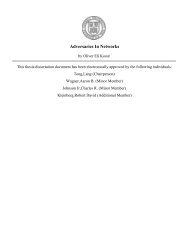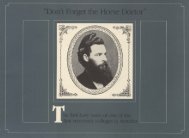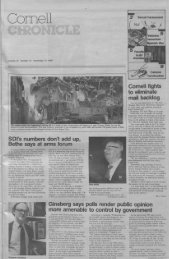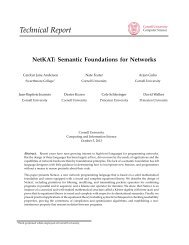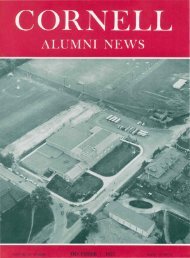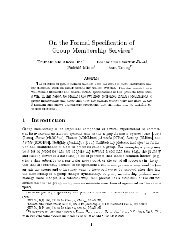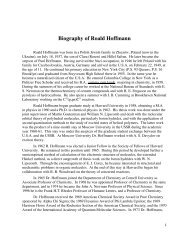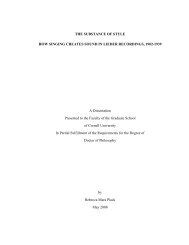ALUMNI NEWS - eCommons@Cornell - Cornell University
ALUMNI NEWS - eCommons@Cornell - Cornell University
ALUMNI NEWS - eCommons@Cornell - Cornell University
You also want an ePaper? Increase the reach of your titles
YUMPU automatically turns print PDFs into web optimized ePapers that Google loves.
heard Professor T. Norman Hurd, PhD<br />
'36, who is on leave from the Department<br />
of Agricultural Economics to serve<br />
as State Budget Director, defend Governor<br />
Rockefeller's controversial twobillion-dollar<br />
budget as a marked step<br />
to achieving pay-as-you-go financing<br />
and restoring fiscal soundness to the<br />
State. Another popular speaker was Professor<br />
Marlin G. Cline, PhD '42, Agronomy,<br />
who told a large audience what he<br />
had learned about Russian agriculture<br />
while on a State Department-sponsored<br />
tour of the Soviet Union last summer.<br />
He reported that Soviet farmers and scientists<br />
"know everything we know in<br />
agricultural science'* and are trying to<br />
equal the United States in per capita<br />
production of meat, butter, and milk.<br />
Almost all the farmers there grow or<br />
raise just about everything, he said. This<br />
often means doing things that would appall<br />
American farmers, like growing<br />
apples in cold climates by so much pruning<br />
and branch-bending that the result<br />
is "an apple bush with questionable<br />
yields." As for Soviet drawbacks, Professor<br />
Gline said, their erosion problem<br />
is "more serious than they recognize." In<br />
his twentieth and last Farm & Home<br />
Week address, Dean Myers urged New<br />
York State farmers to combine into<br />
fewer and larger farm units. Speaking<br />
to an audience of several hundred on<br />
"What's Ahead for the New York Farmer?",<br />
he said that farm communities will<br />
also have to make major adjustment in<br />
their school systems in the near future.<br />
Not only will schools, like farms, have to<br />
be consolidated into a smaller number<br />
of larger, more efficient units, he stated,<br />
but "with farming requiring more knowledge<br />
of business, mechanics, and science,<br />
there is a growing need for college educated<br />
farmers."<br />
High School Students Learn of Science<br />
Helping to swell attendance figures<br />
were some 2000 students from high<br />
schools throughout the State who visited<br />
the College of Agriculture as part of a<br />
high school natural science program<br />
started this year. They had special lectures<br />
and demonstrations in the natural<br />
sciences given by twenty Faculty members<br />
from fourteen Departments of the<br />
College. Divided into groups of twentyfive<br />
and supervised by graduate students,<br />
the youngsters followed a five-day<br />
itinerary of lectures and demonstrations<br />
on such subjects as genetic aspects of<br />
evolution, radioactive substances in research,<br />
how animals hear, what makes<br />
plants flower, and separating chemical<br />
compounds from mixtures. At the close<br />
of the formal program each day, Faculty<br />
members answered questions about<br />
professional opportunities in their fields.<br />
Principals of every public and private<br />
high school in the State were invited<br />
to send selected students and science<br />
teachers to participate in the program.<br />
Professor John M. Kingsbury, Botany,<br />
was in charge.<br />
About 400 events and eighty exhibits<br />
were featured at Farm & Home Week<br />
this year. A spectacular exhibit was a<br />
demonstration of the use of radioactive<br />
materials conducted by Professor Robert<br />
A. Monroe, Avian Physiology. Using<br />
Strange Sounds—Three-year-old Mary Ann<br />
Michel listens to the clicks of a Geiger<br />
counter as it picks up the radiation from her<br />
radium-dialed watch. The demonstration<br />
was part of a larger exhibit on "atomic energy"<br />
in poultry research. Holding the Geiger<br />
counter is Professor Robert A. Monroe,<br />
Avian Physiology, who was in charge of the<br />
exhibit. Holding Mary Ann is her father,<br />
Alwin E. Michel, Jr., Grad.<br />
College of Agriculture<br />
radioactive isotopes, Professor Monroe<br />
traced the path of a quantity of calcium<br />
through a chicken's digestive system,<br />
her blood stream, and into the egg. The<br />
exhibit included flashing lights, moving<br />
needles, and intricate measuring devices<br />
that showed precisely how the chicken<br />
puts calcium into an egg; a, Geiger<br />
counter set up to indicate just how fast<br />
the hen is working; and a two-foot<br />
sketch of a chicken which showed the<br />
path of the isotopic calcium on its way<br />
to the egg. Other well attended events<br />
were a "Chick-o-rama," which showed<br />
baby chicks hatching continuously; an<br />
exhibit of live woodland animals, birds,<br />
and reptiles; and a display of flowering<br />
philodendrons and orchids. In Home<br />
Economics, a featured event was<br />
"Chemistry in the Kitchen," a demonstration<br />
and discussion of how chemical<br />
principles are applied in preparing family<br />
meals. The College also had such<br />
varied exhibits as books and toys for<br />
young children; designs in wood; and<br />
rug making.<br />
Alumni Presidents Gather—Fifteen past-presidents of the Agriculture Alumni Association<br />
attended the fiftieth anniversary luncheon in Willard Straight Hall, March 26. In front is<br />
Jared Van Wagenen, Jr. '91 of Lawyersville, first president of the Association. Second row,<br />
from left, are Thomas E. LaMont '27 of Albion; State Commissioner of Agriculture Don J.<br />
Wickham '24 of Hector; Malcolm B. Galbreath '26 of Morrisville; Richard F. Fricke Ί7<br />
of Ithaca; E. Victor Underwood Ί3 of Ithaca; and Professor A. Wright Gibson Ί7, Director<br />
of Resident Instruction for the College. In the back row are Lloyd E. Curtis '35 of Geneva;<br />
William H. Sherman '35 of Victor; Peter J. McManus '32 of Trumansburg; Joseph H. Pendergast<br />
'38 of Cobleskill; Harold J. Evans '17 of Georgetown; James R. Hazlitt '24 of Hector;<br />
Joseph P. King '36 of Rochester; and Morton Adams '33 of Sodus, who was re-elected<br />
president this year.<br />
College of Agriculture<br />
April 15, 1959<br />
Agriculture Alumni Celebrate<br />
Fiftieth anniversary luncheon of the<br />
College of Agriculture Alumni Association,<br />
March 26, had 215 alumni and<br />
Faculty members gathered in the Willard<br />
Straight Memorial Room. The secretary-treasurer,<br />
Professor A. Wright<br />
Gibson '17, Director of Resident Instruction<br />
in the College, noted that the<br />
Association was formed February 5,<br />
1909, and has served the College in<br />
many ways through the years. He recounted<br />
some of the accomplishments<br />
and said that a current important activity<br />
is the organization of alumni committees<br />
in all counties of the State to<br />
499




